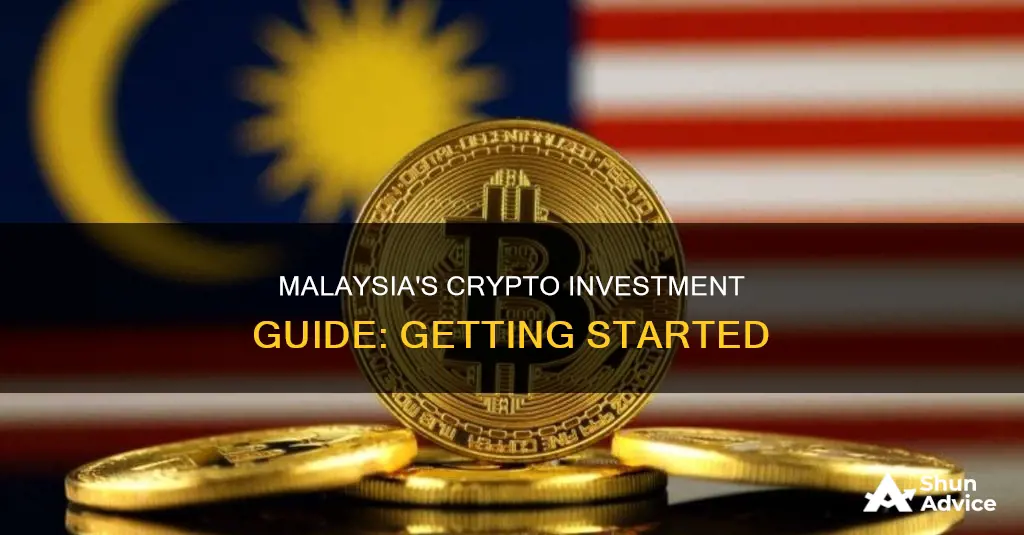
Interest in cryptocurrency in Malaysia has been growing, with many people keen to learn how to invest in it. Cryptocurrency is a digital asset with no physical form, often kept online. It is usually backed by decentralised networks based on blockchain technology. Cryptocurrency allows users to make secure payments and store money without exposing their identity or relying on third-party intermediaries like banks. While it is not a legal tender in Malaysia, it is also not illegal to invest in it. In fact, the government has no intention to ban Malaysians from buying or selling cryptocurrency.
There are several ways to buy cryptocurrency in Malaysia. The most common is through a licensed cryptocurrency exchange or Digital Asset Exchange (DAX). As of 2019, Malaysia's Security Commission (SC) has approved three cryptocurrency exchanges: Luno Malaysia, SINEGY Technologies, and Tokenize Technology. These are the only registered digital asset exchanges in the country. Another way is through a peer-to-peer (P2P) platform, which is operated and maintained by software. However, P2P platforms are not considered legal in Malaysia and come with a higher risk of fraud. Lastly, Bitcoin ATMs are available in Malaysia, but they are less common and have higher transaction fees.
When investing in cryptocurrency in Malaysia, it is important to be aware of the risks. Cryptocurrency is a high-risk, high-reward investment. The value of cryptocurrencies is driven mostly by supply and demand and can be very volatile. There is also a risk of scams and fraud, so it is important to do your research and only invest money you are willing to lose.
| Characteristics | Values |
|---|---|
| Status of Crypto in Malaysia | Not a legal tender but not illegal either |
| Number of Licensed Cryptocurrency Exchanges | 4 |
| Names of Licensed Cryptocurrency Exchanges | Luno, SINEGY, Tokenize and MX Global |
| Number of Approved Cryptocurrencies | 13 |
| Approved Cryptocurrencies | Bitcoin, Ethereum, Litecoin, Ripple, Bitcoin Cash, Uniswap, Chainlink, Cardano, Solana, Avalance, Polygon, Polkadot, Cosmos |
| Cheapest Way to Fund Exchange | Depositing money from a bank account |
| Risks of Crypto in Malaysia | High volatility, irreversible transactions, scams |
What You'll Learn

Is crypto legal in Malaysia?
While cryptocurrencies like Bitcoin are not recognised as legal tender in Malaysia, they are not illegal either. The Malaysian courts have recognised cryptocurrency as a security and a commodity.
In the 2018 case of Luno Pte Ltd & Another v Robert Ong Thien Cheng, the Shah Alam Sessions Court held that cryptocurrency falls within the ambit of "anything" under Section 73 of the Contracts Act 1950 ("CA 1950") as cryptocurrency is a form of commodity with an attached value. On appeal, the Shah Alam High Court upheld the Sessions Court's ruling.
The Capital Markets and Services (Prescription of Securities) (Digital Currency and Digital Token) Order 2019 was introduced to provide guidance on when and how "digital currency" and "digital tokens" (collectively known as "digital assets") are recognised as securities for the purposes of Malaysia's securities laws.
The Securities Commission of Malaysia has approved the buying and selling of five types of cryptocurrencies: Bitcoin (BTC), Ethereum (ETH), Ripple (XRP), Litecoin (LTC), and Bitcoin Cash (BCH). There are currently three registered and approved Digital Asset Exchange (DAX) operators in Malaysia: Luno Malaysia Sdn Bhd, SINEGY Technologies (M) Sdn Bhd, and Tokenize Technology Sdn Bhd.
It is important to note that members of the public are not permitted to offer, issue, or distribute any digital assets in Malaysia without obtaining registration from the Securities Commission. Those who do so may be liable and face fines of up to ten million ringgit or imprisonment for up to ten years, or both.
While it is legal to buy and sell cryptocurrencies in Malaysia, it is a fairly new and volatile asset class. Therefore, it is essential to do your research and treat it with caution.
The Ultimate Guide to Investing in Bitcoin
You may want to see also

Where to buy crypto in Malaysia
The legal way to buy crypto in Malaysia is through a licensed Digital Asset Exchange (DAX). The Securities Commission of Malaysia requires these platforms to have an independent trustee to hold investors' funds, so that if the platform fails, the Commission can protect your funds to some extent. There are four such exchanges licensed and regulated by the Securities Commission of Malaysia: opening an account with them is as easy as going to the website or app, completing the verification process, transferring your funds, and buying the cryptocurrencies offered.
Another way to buy and sell crypto in Malaysia is through a peer-to-peer marketplace (P2P). Instead of going through an exchange platform, you can sell it directly to another individual. Sellers will post what they have for sale, how much they want for it, and acceptable payment methods, which may include your BigPay e-wallet. All you have to do is register and get in touch with the buyer.
There are also several other crypto platforms where you can buy and sell. Luno is one of the few platforms that allow you to buy and sell in Ringgit Malaysia. It also supports credit card and bank transfers, but it has relatively low liquidity and higher fees compared to other platforms. SINEGY is a Malaysian brand founded in 2017, and currently offers two types of crypto on their platform: bitcoin and ethereum. There is no minimum deposit required, and bitcoin withdrawal fees have been slashed to 0.05%. Tokenize was founded by a Malaysian, but is based in Singapore. It has more crypto options than SINEGY, a mobile app, and a referral and points system, but there is a minimum deposit amount of RM100.
Kraken is based in the United States and is not regulated in Malaysia, so you won't be able to trade using the Ringgit. Huobi is not regulated in Malaysia either, except in Labuan.
The Legal Age for Bitcoin Investment Explained
You may want to see also

How to buy crypto in Malaysia
Crypto is not a legal tender in Malaysia, but it is also not illegal to own or trade. Selected cryptocurrencies are legal, and the Securities Commission Malaysia regulates them under the Digital Assets Guideline, issued on 28 October 2020.
Where to buy crypto in Malaysia?
Licensed Cryptocurrency Exchanges
The legal way to buy crypto in Malaysia is through a licensed Digital Asset Exchange (DAX). As of 2023, there are four approved exchanges: Luno, SINEGY, Tokenize and MX Global. Opening an account is easy: simply register and complete the verification process, transfer your funds, and buy any of the cryptocurrencies offered.
Peer-to-Peer Marketplace
Another way to buy and sell crypto in Malaysia is through a peer-to-peer marketplace (P2P). Instead of going through an exchange platform, you can sell directly to another individual. However, this method is not considered legal in Malaysia, and there is a high risk of fraud.
What to consider before buying crypto in Malaysia:
Irreversible transactions
Cryptocurrencies like Bitcoin have irreversible transactions to protect against fraud and double-spending. Always double-check the amount, as well as the receiver and sender address to avoid an irreversible mistake.
Volatility and risk
Cryptocurrency is a new and volatile asset class with high risk. Do your research and treat it with caution. Only invest money you can afford to lose.
Fees
Purchasing crypto through any platform incurs fees. The cheapest way is usually by depositing money from your bank account onto your chosen exchange and then using it for purchases. Credit cards typically incur much higher fees, and debit cards charge reasonable fees with near-instant fund deposits.
The Bitcoin Investment: How Much Should You Risk?
You may want to see also

How to sell crypto in Malaysia
Selling crypto in Malaysia can be done through a few different avenues. Firstly, it is important to note that while buying and holding Bitcoin and other cryptocurrencies is legal in Malaysia, it is not considered legal tender, and cryptocurrency payment methods are prohibited at local businesses unless the business explicitly chooses to accept them. With that in mind, here are the steps to sell crypto in Malaysia:
Licensed Cryptocurrency Exchanges
The Malaysian government has licensed and regulated several Digital Asset Exchanges (DAX) where you can sell your crypto. These platforms are required by law to have an independent trustee to manage investor funds, providing some level of protection for your funds. To sell on these exchanges, you would open an account, complete the verification process, transfer your crypto funds, and then sell them for the local currency or other cryptocurrencies.
Peer-to-Peer Marketplace
Another option for selling crypto in Malaysia is through a peer-to-peer marketplace (P2P). This involves directly selling your crypto to another individual without going through an exchange platform. You can register on one of these platforms and get in touch with potential buyers to negotiate a sale.
Crypto Wallets
Before buying or selling crypto, you will need to acquire a crypto wallet. There are several types of crypto wallets in Malaysia, including exchange wallets, mobile wallets, and hardware wallets. Exchange wallets are provided by crypto exchanges and are great for everyday traders, but they are constantly under threat from theft and hacking attempts. Mobile wallets are tied to your mobile device and are considered safer, but losing your device means losing access to your wallet. Hardware wallets are offline and highly secure, making them ideal for long-term holders.
Bitcoin ATMs
Bitcoin ATMs offer a convenient way to sell Bitcoin in Malaysia. You can usually find these ATMs in supermarkets or gas stations, and they allow you to exchange your Bitcoin for cash by scanning a QR code and transferring the funds to your Bitcoin wallet. However, Bitcoin ATMs typically charge higher fees than other methods.
When selling crypto in Malaysia, it is important to consider the fees associated with different platforms and methods, as well as the security and protection of your funds. Always do your research and understand the risks involved before selling or investing in cryptocurrencies.
The Ultimate Guide to Investing in Bitcoin
You may want to see also

Risks of buying crypto in Malaysia
While the Malaysian government has implemented regulations to provide a degree of clarity and protection for investors, there are still risks associated with buying crypto in Malaysia that individuals should be aware of. Here are some key risks to consider:
- Price Volatility: Cryptocurrencies are known for their high volatility, with prices fluctuating significantly over short periods. This volatility can result in substantial gains or losses for investors, and individuals should be prepared for rapid changes in the value of their investments.
- Regulatory Changes: The regulatory landscape for cryptocurrencies is evolving, and future changes could impact the legality and accessibility of crypto in Malaysia. The current regulatory framework provides some protection, but individuals should stay informed about potential changes to avoid legal issues.
- Security Risks: Cryptocurrency exchanges and wallets are attractive targets for hackers due to the nature of the assets. While regulated exchanges have robust security measures, there is still a risk of funds being compromised. Individuals should prioritise exchanges with strong security protocols, such as two-factor authentication (2FA), and consider diversifying their storage methods to minimise the impact of potential breaches.
- Irreversible Transactions: Cryptocurrencies like Bitcoin have irreversible transactions to prevent fraud and double-spending. This feature means that mistakes in recipient addresses or overpayments cannot be undone. Individuals must exercise caution and carefully verify transaction details to avoid irreversible errors.
- Lack of Regulatory Oversight: While selected cryptocurrencies are legal and regulated in Malaysia, there are numerous other platforms and cryptocurrencies that are not approved or regulated. Investing in these unregulated options can expose individuals to security vulnerabilities, potential legal issues, and a lack of regulatory protection.
- High Fees: Purchasing crypto through any platform incurs fees, and these can add up over time. Individuals should be aware of the various fees associated with different payment methods and platforms. While bank transfers are typically the cheapest option, they may take several days, during which the volatile crypto market could change significantly. Credit card fees tend to be much higher, and credit card providers may also charge cash advance fees. Debit cards often offer a reasonable balance between fees and deposit speed.
- Complex and Evolving Landscape: The world of cryptocurrency is complex and constantly evolving, with new projects, tokens, and platforms emerging regularly. Staying informed about the latest developments and conducting thorough research is essential for making informed investment decisions.
- Scams and Fraud: Scammers often target the crypto space, and individuals should be vigilant to avoid falling victim. Common tactics include creating fake websites and social media accounts, using high-pressure tactics, and promising high returns with little to no risk. It's crucial to verify the legitimacy of any platform or investment opportunity and to exercise caution when sharing personal information or funds.
The Ultimate Guide to Investing in Bitcoin Without Coinbase
You may want to see also
Frequently asked questions
Crypto is not a legal tender in Malaysia, but it is also not illegal to invest in it. There are no laws prohibiting the exchange of services or assets of cryptocurrencies.
You can buy crypto on a licensed cryptocurrency exchange, a peer-to-peer marketplace, or a Bitcoin ATM.
Luno, SINEGY, Tokenize, and MX Global are some of the popular licensed exchanges in Malaysia.
Crypto is a high-risk and volatile asset class. Always do your research and treat it with caution. Cryptocurrency investments are irreversible, so double-check the recipient address and the amount before sending.







